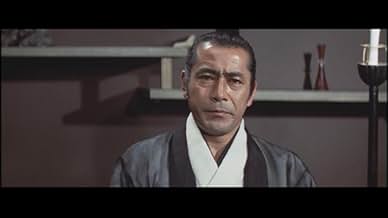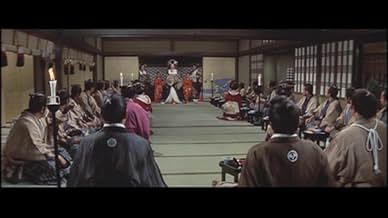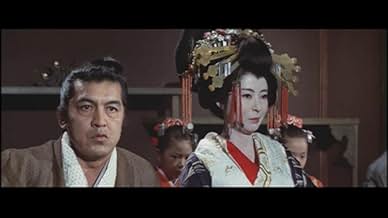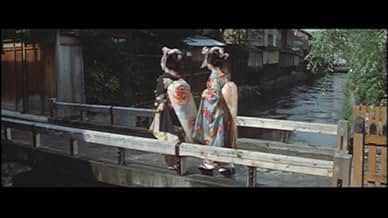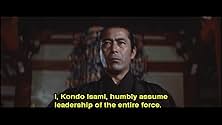Ajouter une intrigue dans votre langueFeudal Japan. Kamo Serizawa and Isami Kondo turn a collection of student fencers into a band of assassins known as the Shinsen Group, devoted to the Tokugawa shogunate and to an elegant code... Tout lireFeudal Japan. Kamo Serizawa and Isami Kondo turn a collection of student fencers into a band of assassins known as the Shinsen Group, devoted to the Tokugawa shogunate and to an elegant code of action and behavior. Kondo leads the band against the forces of the Emperor in hopes o... Tout lireFeudal Japan. Kamo Serizawa and Isami Kondo turn a collection of student fencers into a band of assassins known as the Shinsen Group, devoted to the Tokugawa shogunate and to an elegant code of action and behavior. Kondo leads the band against the forces of the Emperor in hopes of preventing his restoration to the throne.
- Récompenses
- 1 victoire au total
- Yasubo Katsu
- (as Ganemon Nakamura)
Histoire
Le saviez-vous
- AnecdotesThis film is part of the jidaigeki (period drama) genre, and it is also a chanbara (sword-fighting) film.
Toshiro Mifune stars as Isami Kondo, the noble and idealistic farmer-turned-swordsman who becomes chief of the Shinsengumi, as the group is known, after killing Serizawa Kamo (played by Rentaro Mikuni), the first chief, a samurai who had become corrupt and arrogant. The film follows key events and battles in the course of the period covered, 1863-69, and the shifts in the political winds, as the Emperor soon aligns himself with pro-western forces, the Shogun withdraws from the struggle, and the Shinsengumi find themselves declared outlaws and rebels despite the fact that the group had originally formed to combat rebels opposing the Shogun. All of this is seen through the eyes of Kondo, an honest but hardened man who has imposed on his men a strict set of samurai rules which require the act of seppuku (ritual suicide) by any of them if they break a rule. As he tries desperately to hold onto his obsolete code, his world comes crashing down around him and he and his men (and Japan) pay a huge price. At some point, it all must seem supremely futile to him, yet he trudges on, following his destiny to the sad, bitter end.
The movie doesn't seem to take sides but simply presents scenes from the rise and fall of the Shinsengumi. Their values seem horribly outmoded even at the time the events are taking place and they seem to cause an awful lot of pointless death and destruction. Kondo is neither romanticized nor glamorized, although Mifune's portrayal certainly ennobles him as a sincere, loyal man who was simply swept up and engulfed in the tide of overwhelming historical and social forces that had been building up throughout the feudal era. Japanese viewers don't need a guide to the background story, since this is a piece of history that is rigorously taught in their classes. Non-Japanese viewers, however, may need to study a little before watching this film (and I don't mean watching THE LAST SAMURAI first), since it's never clear from the film what the differences are between the Shogun and the Emperor or why they're at war. Who's fighting who and why are questions not adequately answered for viewers not already familiar with the history behind the movie, so I would urge some research into the period first. There were a lot more issues at play than the question of Japan's impending modernization.
This is one of the most important Japanese samurai films, although I would hesitate to group it with such other classic samurai films as SEVEN SAMURAI, YOJIMBO, the SAMURAI trilogy, SWORD OF DOOM and SAMURAI REBELLION, to name a few. There is no adventure here, no excitement or romance. The swordplay is not intricately choreographed. It is awkward, messy, and grueling, exactly the way it would be if undertaken by farmers-turned-swordsmen, even though they have trained in swordplay for years under Kondo. One of the new recruits is an accountant from an affluent family whose fate is particularly heart-wrenching and provides the turning point of the film.
It's all masterfully photographed and staged, complete with a somber music score by veteran composer Masaru Sato. This is a film that should be seen by all those interested in Japanese cinema and Japanese history. I would particularly like to single this film out for fans of the Japanese animated TV series, "Rurouni Kenshin," and its made-for-video prequels (marketed in the U.S. as "Samurai X"), all of which touch on, in some way or other, the turbulent period covered by this movie. I should also point out that a live-action TV series entitled "Shinsengumi," on the same subject, premiered on Japanese TV in 2004.
- BrianDanaCamp
- 29 juil. 2005
- Permalien
Meilleurs choix
Détails
- Date de sortie
- Pays d’origine
- Langue
- Aussi connu sous le nom de
- Shinsengumi: Assassins of Honor
- Sociétés de production
- Voir plus de crédits d'entreprise sur IMDbPro
- Durée2 heures 2 minutes
- Mixage
- Rapport de forme
- 2.35 : 1
Contribuer à cette page


